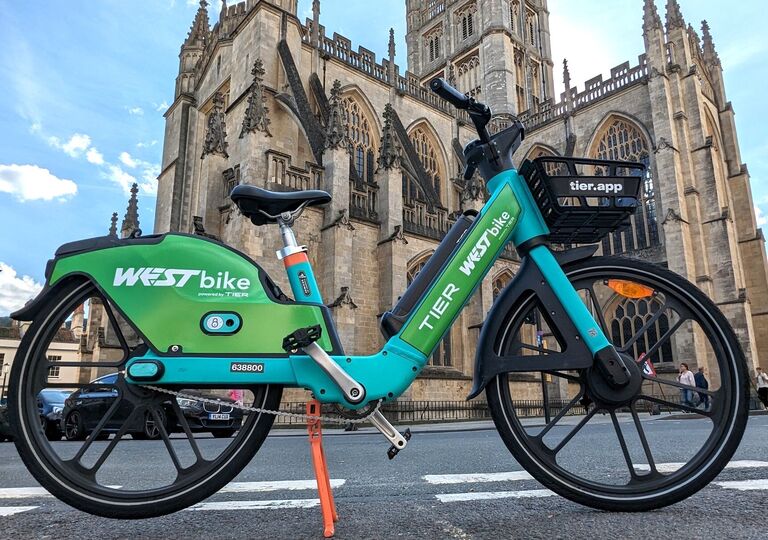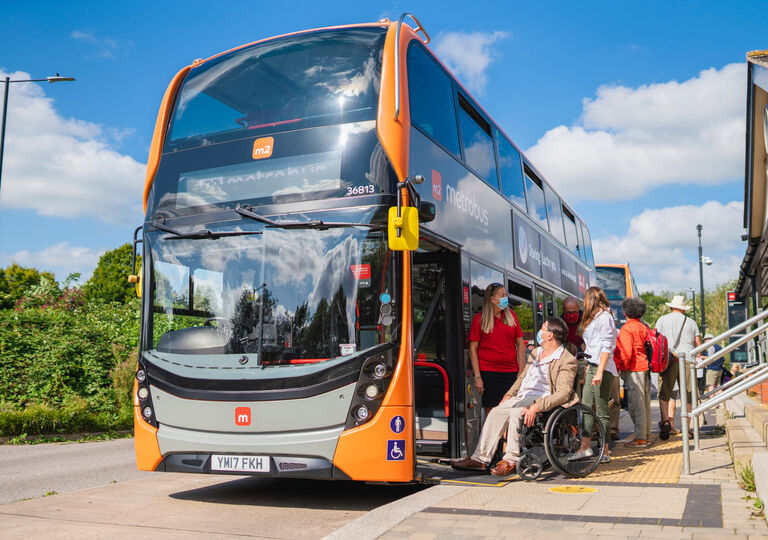
West of England E-Scooter Trial
Since October 2020, residents in the West of England have been able to hire e-scooters as part of a government trial.
Led by the West of England Combined Authority in partnership with Bath & North East Somerset Council, Bristol City Council and South Gloucestershire Council.
In July 2022, the Department for Transport announced that it was extending the trial period until May 2024.
Want to give it a go? Get started now.

Expanding the e-scooter trial
In light of the success of e-scooters in the region, the West of England Mayoral Combined Authority has negotiated a brand-new contract with a different provider - TIER - that will take over the running of the scooters in the region.
Alongside the e-scooters, for the first time 1,500 new pedal-only e-bikes and 20 e-cargo bikes will be phased into the scheme. 100 brand-new e-scooter parking racks will be introduced to help to keep the fleet tidy.
Key findings from the e-scooter evaluation report
FREQUENTLY ASKED QUESTIONS
The Department for Transport is fast tracking e-scooter trials across the UK as part of work to relieve pressure on public transport whilst social distancing is required.
As one of four Future Transport Zones the West of England’s trial is part of wider plans to use innovative technologies to make it easier to get around the West of England by giving people alternatives to driving.
The trial will help understand any issues and challenges of legalising e-scooter use on the region’s roads. If successful they could become a permanent sustainable option for travel in the region.
The West of England’s e-scooter trial covers the geographical areas of Bath and North East Somerset Council, Bristol City Council, and South Gloucestershire Council, so e-scooters hired or leased as part of the trial can be used across this region. North Somerset Council does not form part of the trial area.
The trial launched on 29 October 2020.
The trial will be in place until May 2024 and has been fast tracked in response to the Covid-19 pandemic to offer a new sustainable way to travel while social distancing is in place on public transport.
TIER is the current operator for e-scooters, e-bikes and e-cargo bikes in the West of England. TIER Mobility operates in 85+ cities in 10 countries.
We have worked closely with our councils, police and operators to put in place measures to make this trial as successful as possible.
At the time of launching, e-scooter speeds were limited to between 3 to 10 mph, depending on the operating zone. The upper speed limit increased to 12.5mph following support from Voi, and Avon and Somerset Police that higher speeds would improve safety on busy roads for e-scooter users.
Geofencing technology allows slower speed restrictions to be imposed in defined areas which have been identified in collaboration with the police, the councils, the operator, and stakeholder groups including equalities groups, and continue to be refined.
E-scooters are classified as motorised vehicles. All users must register by providing their full or provisional driving licence. Users who commit road traffic offenses whilst using an e-scooter, including lending their licence to somebody else, could receive points on their driving licence, fines, and/or prosecution by the police.
We know that most people will use e-scooters responsibly and we will work with the operator and the police to address irresponsible use.
No. Only e-scooters which are leased or hired as part of a local authority trial which has been authorised by the Department for Transport are legal to use. The use of privately-owned e-scooters on public land remains illegal.
Retailers need to inform e-scooter customers of the restrictions on e-scooter use so that users remain within the law. Police and Trading Standards have sent a letter to retailers to remind them of their legal obligations.
As with any motorised vehicle, users are subject to national legislation requiring them to drive responsibly, and legally. Users may receive points on their licence, or lose their licence, as well as receiving a fine for using a privately-owned scooter on public land.
It is illegal to ride an e-scooter on the pavement. E-scooters which are hired or leased through the West of England’s trial can be ridden on any public land where cycles are permitted, within the operating zone.
It is illegal to ride an e-scooter on the footway.
We are engaging with a range of stakeholders in the region, including several groups which represent vulnerable road users, such as those with visual impairments. We are committed to working closely with these stakeholders throughout the trial.
Users must park e-scooters in Mandatory Parking Zones in order to finish their ride. In addition, users are required to take a photo of their parked scooter at the end of their ride, to prove they have parked considerately.
We are working closely with Voi and the authorities to introduce docking stations andon-street markings to encourage good parking behaviour from users and are considering reallocating on-street parking to e-scooter parking.
Voi has added content to their online traffic school, RideLikeVoila about the safety of vulnerable road users and is working with the West of England Combined Authority, councils and Avon & Somerset Police to ensure e-scooters are used responsibly.
Riders are incentivised to park scooters correctly within virtual parking areas, and local on-street ambassadors will educate users on riding and parking safety. Local teams will manage the scooter fleet daily and will work closely with police to ensure that the scooters are not a menace for other road and pavement users. Users who behave inappropriately will be barred from the service.
The Combined Authority, the participating authorities and Voi will continue to work together through the trial, and with DfT support, to identify and trial best parking practices.
Further information
ESCOOTERTRIAL@WESTOFENGLAND-CA.GOV.UK


